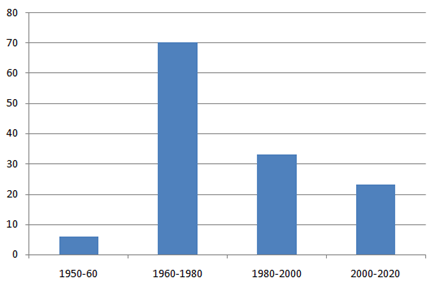Basics:
-
- Articles 352 to 360 (Part XVIII) of the Constitution deals with emergency provisions.
- The aim is to safeguard the sovereignty, unity, integrity and security of the nation.
- Three types of emergencies: National emergency, State emergency and Financial emergency.
National Emergency (Article 352)
-
- An emergency due to war, external aggression or armed rebellion.
- External Emergency– When national emergency is declared on the ground of ‘war’ or ‘external aggression’.
- Internal Emergency– When national emergency is declared on the ground of ‘armed rebellion’.
- Some important amendments:
- 38th Amendment Act 1975– President can issue different proclamations even when such a proclamation already issued by him is in operation.
- 42nd Amendment Act 1976– President can limit the operation of National Emergency to a specified part of India.
- 44th Amendment Act 1978– The words ‘armed rebellion’ substituted for ‘internal disturbance’. Also, emergency can be declared only on the concurrence of cabinet and not merely on the advice of prime minister.
- Parliamentary approval & duration-
- 44th Amendment Act, 1978- Approval by both Houses within one month
- Initially lasts for six months, can be extended indefinitely with Parliamentary approval every six months.
- Approval by special majority (total membership majority + 2/3rd of present & voting).
- Can be revoked by the President anytime without parliamentary approval.
- Effects-
- Effect on Centre-State Relations
- Centre controls state administration and can direct states on any matter.
- Parliament can make laws on State List subjects
- President can modify financial distribution between Centre-State
- Effect on Lok Sabha & State Assemblies
- The terms can be extended by one year at a time but not beyond 6 months after Emergency ends.
- Effect on Fundamental Rights
- Article 358: Automatically suspends Article 19.
- Article 359: The President can suspend enforcement of Fundamental Rights, except Articles 20 & 21.
- Effect on Centre-State Relations
Financial Emergency (Article 360)
-
- Due to a threat to the financial stability or credit of India.
- Inspired by the National Recovery Act (USA, 1933) to handle financial crises.
- 38th Amendment Act (1975) – President’s satisfaction final and beyond judicial review.
- 44th Amendment Act (1978) – Satisfaction of President not beyond judicial review.
- Parliamentary approval & duration-
- Must be approved by both houses of Parliament within two months.
- No need for repeated parliamentary approval.
- Can be revoked by the President without parliamentary approval.
- Effects-
- The Central government gains full financial control over states.
- The President can:
-
- Direct states to follow financial propriety norms.
- Order salary reductions for state government employees.
- Reserve state financial bills for Presidential consideration.
- Reduce salaries of Union government employees and judges.
-
State Emergency/President’s Rule (Article 356)
-
- Grounds of Imposition
- Article 355: Centre has duty to ensure that state governments function as per the Constitution.
- Article 356: President’s Rule can be imposed if state government cannot function as per the Constitution.
- Article 365: President’s Rule can be imposed if state fails to comply with directions of the Centre.
- Parliamentary approval and duration
- Must be approved by both Houses of Parliament within two months.
- Once approved, it lasts for six months, extended up to 3 years with Parliament’s approval every six months.
- Conditions for an extension beyond 1 year:
- A National Emergency must be in effect in the whole or part of the state.
- The Election Commission must certify that elections cannot be held due to difficulties.
- The President can revoke the proclamation at any time without parliamentary approval.
- Effect-
- The state legislative assembly may be dissolved or suspended.
- The state council of ministers and chief minister are dismissed.
- The President takes over state government functions and powers of the Governor.
- Parliament handles:
- Passing state bills and budget.
- Promulgating ordinances for the state if Parliament is not in session.
- State High Courts remain unaffected—the President cannot take over their powers.
- Grounds of Imposition
Evolution of Article 356:
-
- President’s Rule has been imposed 132 times since 1950.
- After S R Bommai case- 29 times
- Misused- 48 times
- The highest number of Presidents rule during Indira Gandhi time i.e. 50 times

Figure: President’s rule imposed over the years
Case laws:
-
- R. Bommai vs Union of India (1994): President’s Rule is subject to judicial review.
- Rameshwar Prasad Case (2006): President’s Rule should be based on objective criteria and not solely on the subjective basis.
Misuse:
-
- Vagueness in provisions of the Constitution.
- Unitary character which gives scope for union intervention in state affairs.
- Lack of link between state level politics and democracy.
- Politics based on party interests rather than principles.
- Doctrine of committed governors.
- Coalition politics at state level, defection and other challenges Public order & security.
Committee recommendations:
| Committee | Recommendations |
|---|---|
| MM Punchhi Commission | • Localized approach to Emergency provisions under Article 356. • Should apply only to specific areas instead of the entire state. |
| Sarkaria commission | • Must be used as a measure of last resort. • Clear warning to be issued and alternative options be explored before imposition. • Must be a ‘speaking document’ and be given wide public access. • An explanation should be sought from the state before action is taken. |
Way Forward
-
- Political problems can be solved through quality of politics through statesmanship rather than through legal interventions.
- There should be legal safeguards.
- The ultimate safeguards is by the people that there should be public pressure against misuse of constitutional powers & machineries by the governments.
- For democratic governance & healthy union-state relations, the union government should act as per letter & spirit of the Constitution.




